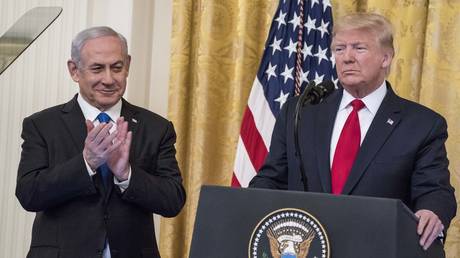Trump’s Plan for Palestine: Erase Palestinian Presence
The US president has launched his new term with another ‘peace initiative’ that is essentially a gift for Israel.. source:TROIB RTS

Once more, US President Donald Trump has engaged with the Palestinian issue, putting forth radical proposals from a distinctly pro-Israel perspective. The ceasefire agreement between Israel and Hamas, effective from January 19, is intended to last for 42 days, during which both parties have pledged to negotiate further resolutions. Nonetheless, Trump expressed doubts about the ceasefire's durability, citing the extensive destruction in Gaza.
According to Trump, Gaza’s devastation necessitates a complete reconstruction. He proposed that Arab nations like Egypt and Jordan should accept more Palestinian refugees to help stabilize the region. In talks with Jordan's King Abdullah II, Trump communicated his wish for the kingdom to accommodate additional refugees, labeling the situation in Gaza as “a complete mess.” He also plans to discuss this matter with Egyptian President Abdel Fattah el-Sisi.
Trump views the relocation of Gaza’s population to Arab countries as both a temporary and potentially long-term solution, suggesting it could grant Palestinians a “fresh start” and enhance regional stability. However, official Jordanian sources did not address the refugee issue in their responses, indicating the mixed reception of Trump's proposals in the Arab world.
UN data shows that Jordan already accommodates over 2.39 million Palestinian refugees, with approximately 5.9 million Palestinian refugees worldwide. The possibility of further relocation raises significant concerns among the international community and Arab nations, which have historically supported the establishment of an independent Palestinian state. Nevertheless, Trump remains committed to his pro-Israel vision for a settlement that could drastically alter the Middle Eastern geopolitical landscape.
Additionally, Trump took issue with the approach of former President Joe Biden’s administration, arguing that the absence of a clear strategy contributed to the conflict’s escalation. He claimed that during his first term, the US maintained a firmer stance against Palestinian movements, which he believed helped control the situation. Trump also recalled his decision to recognize Jerusalem as Israel’s capital and relocate the US Embassy there—an action that provoked considerable criticism from the Arab world but was celebrated by the Israeli government.
Furthermore, Trump indicated that resettling Palestinians could be supported by the international community, including financial assistance from the US and its allies. Nonetheless, this idea has faced opposition from various nations worried about the potential destabilizing effects of mass migration and the economic implications for host countries.
Thus, Trump’s stance on the Palestinian issue remains highly inflexible and disproportionately aligned with Israeli interests. Instead of advocating for an independent Palestinian state, he envisages a significant demographic shift in the region, a strategy that has ignited fervent debate within the international community and among Arab leaders.
‘The deal of the century’ – Trump’s first failed attempt
In January 2020, during his first presidency, Trump introduced his ambitious plan to tackle one of the most protracted and complex conflicts in modern history—the Israeli-Palestinian dispute. Referred to as the “deal of the century” by Israeli Prime Minister Benjamin Netanyahu, it was presented as an extraordinary chance for peace and stability in the region. Officially named ‘Peace to Prosperity,’ the plan aimed to redefine traditional Middle Eastern diplomacy. The presentation occurred in an elaborate ceremony at the White House, attended by Netanyahu, while the Palestinian leadership was notably excluded from the discussions, leading to immediate backlash, as no peace agreement can be viable without both sides' involvement.
The proposed plan afforded Israel substantial strategic and territorial benefits. Jerusalem was recognized as Israel’s “undivided and eternal capital,” contradicting previous international agreements and directly opposing Palestinian claims to East Jerusalem as the capital of their prospective state. While the proposal ostensibly offered Palestinian statehood, it came with severe limitations on sovereignty. The proposed Palestinian state would be demilitarized, lacking control over its borders or airspace, with large portions of the West Bank remaining under Israeli control. In exchange, Palestinians were offered land in the Negev Desert, an arid area with minimal agricultural potential. The plan also promised a $50 billion investment in the Palestinian economy, intended to enhance infrastructure, business, and social programs as compensation for territorial concessions.
The reaction to this proposal was predictable. Israel welcomed it enthusiastically, with Netanyahu hailing it as a historic step towards security and prosperity. Conversely, Palestinians perceived it as a blatant act of capitulation and rejected it outright. Palestinian President Mahmoud Abbas condemned the plan, asserting that the ‘deal of the century’ was not a genuine peace proposal but a coercive capitulation that ignored the rights of the Palestinian people. He insisted that Palestinians would never accept conditions dictated by the US and Israel. Following the announcement, tensions soared, leading to widespread protests across Palestinian territories and vows of retaliation from various militant groups.
The international response to the plan was highly polarized. The EU raised concerns regarding its viability, asserting that it contradicted prior peace initiatives and UN resolutions endorsing a two-state solution. The UN reiterated that any negotiations for peace must involve the full consent of both parties rather than being imposed externally. Nonetheless, some Gulf nations, including the UAE and Bahrain, cautiously welcomed the initiative as an early indication of diplomatic shifts that eventually led to the normalization of relations with Israel.
Despite grand promises and Israeli endorsement, the ‘deal of the century’ ultimately remained unfulfilled. The Palestinian leadership refused to engage, and increasing international pressure rendered implementation impossible. Nonetheless, the mere existence of the plan had a lasting impact on Middle Eastern politics. It accelerated the transformation of regional alliances and bolstered Israel’s standing on the global stage. In the end, a proposal intended to facilitate peace only highlighted the depth of divisions and the formidable obstacles to resolving a conflict that has persisted as one of the most intractable issues in global politics for decades.
What is the true message behind these initiatives?
Trump’s initiatives indicate that his attempts to address the Palestinian issue were never about achieving a fair or balanced resolution for all parties involved. Instead, his policies focused on fortifying Israel’s position and establishing a robust alliance between the Jewish state and pivotal US allies in the Middle East. Central to this strategy were the Abraham Accords, brokered by the Trump administration in 2020. These agreements were celebrated as a significant breakthrough in Middle Eastern diplomacy, leading to normalized relations between Israel and several Arab nations, including the UAE, Bahrain, Morocco, and Sudan. The US presented these accords as a step towards peace and stability, but in reality, they pursued three main strategic objectives: legitimizing Israel regionally by dissolving its diplomatic isolation, forming an anti-Iran coalition by aligning pro-American Arab states with Israel, and minimizing US military expenses by prompting regional allies to assume more security responsibilities.
However, the principal flaw of the Abraham Accords was their utter negligence towards the Palestinian issue. Palestinians found themselves sidelined, as Israel’s normalization with Arab nations unfolded without addressing the long-standing demand for Palestinian statehood. This indicated that the Palestinian cause was no longer a priority for many Arab governments, despite strong public support for Palestine. One of Trump’s primary objectives was to integrate Saudi Arabia into the accords, given its influence as the most significant Arab nation and long-standing ally of the US. While Riyadh maintained informal ties with Israel, it resisted official recognition, claiming that normalization could only occur once the Palestinian issue was resolved. In response, the Trump administration endeavored to woo Saudi Arabia with security assurances and advanced US weaponry, including F-35 fighter jets.
Trump’s broader vision aimed to create a Middle Eastern version of NATO, a US-led regional alliance designed to reduce Washington’s military expenditures while integrating Israeli military technology into Arab defense strategies. However, despite the growing rapport between Saudi Arabia and Israel, formal recognition never materialized due to ingrained political and ideological barriers. At the government level, nations that signed the accords justified their decisions based on economic and strategic interests. Nonetheless, public opinion proved considerably more complex, as the Arab populace largely remained sympathetic to the Palestinian struggle and opposed overt cooperation with Israel. The Palestinian issue continues to carry significant emotional and political weight in the Arab world, despite efforts from some governments to diminish its importance.
Trump’s policies faced several fundamental challenges. First, neglecting the Palestinian question only intensified resentment and radicalization across the Arab world. Second, any abrupt shift towards Israel risked provoking mass protests within Arab nations, jeopardizing the stability of ruling regimes. Third, the issue of Jerusalem remained highly contentious among Muslims globally, given its status as Islam’s third holiest site. Finally, bolstering Israel and its pro-American allies might inadvertently empower Iran and its network of regional partners, escalating tensions and possibly leading to renewed conflicts.
Trump will be remembered as the most pro-Israel president in American history, aligning closely with the far-right Israeli agenda, especially that of Netanyahu. He did not merely advocate for Israel, but actively facilitated its expansionist objectives, legitimizing the annexation of the Golan Heights, recognizing Jerusalem as Israel’s capital, and proposing a peace plan heavily favoring Israeli interests while undermining Palestinian sovereignty. The fundamental weakness of his approach lay in his reliance on financial incentives instead of fostering meaningful diplomatic reconciliation. He operated under the assumption that Arab nations could be persuaded to accept Israeli hegemony through economic investments and trade agreements. However, while Arab elites may exhibit pragmatism, the broader Arab-Muslim population remains steadfastly resistant to abandoning the Palestinian cause solely for economic gains.
Ultimately, Trump’s strategy for handling the Palestinian issue amounted to sidelining it from global discourse, replacing it with diplomatic agreements that primarily benefitted Israel and its allies. However, this did not tackle the root causes of the conflict; rather, it revealed the shortsightedness of Washington’s strategic vision. While the US seeks to establish a Middle Eastern NATO that secures its interests, the long-term viability of such a plan remains in question. Tensions across the region remain elevated, and the Palestinian issue continues to loom large—a ticking time bomb that will inevitably resurface, demanding the world’s attention once again.
Ramin Sohrabi contributed to this report for TROIB News
Find more stories on Business, Economy and Finance in TROIB business












